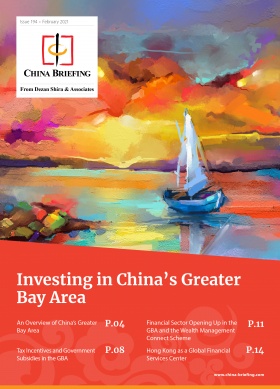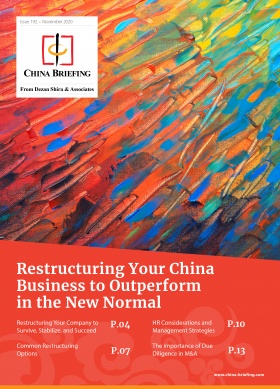Beijing’s Investment Opportunities for Foreign-Owned Investors
We profile Beijing’s investment opportunities in key services and technology industries, based on recent market-openings and the roll-out of incentives that will benefit foreign investors as well.
Over the past four decades, China’s economic growth has been driven mainly by the manufacturing sector, which benefited from an enormous low-cost labor pool as the country opened to export markets. Now, as labor and land costs grow and its workforce becomes increasingly well-educated, China is transitioning from a manufacturing-heavy economic model to a services-led one.
A country’s gross domestic product (GDP) is contributed to by three main sectors; agriculture as the primary industry, construction, and manufacturing as the secondary industry, while the tertiary industry is the services sector.
In China, according to government data, in 2013, the primary industry accounted for 10 percent of the GDP, the secondary industry for 44 percent, and the tertiary industry 46 percent. Looking at those same sectors in 2020, services now account for 54 percent of GDP and contribute 60 percent of China’s total economic growth.
China’s 14th Five-year Plan (2021–2025) is promoting the development of and access to the country’s service sector in general, which is a positive indicator for foreign investors. There is little doubt that in 2021 the services sector will continue to be a priority area for innovation and growth for China. New developments in this sector can give clues as to where foreign investment opportunities lie.
Beijing has been opening up its service sector for many years now. In February 2017, the local government launched financial incentives and investment initiatives to encourage high-value-added service exports, which had a dramatic impact on the sector.
With added value in services contributing 83.5 percent of its GDP in 2019, Beijing has steadily developed a reputation as China’s service hub. In 2020, the local government released reform measures aimed at optimizing the foreign investment environment and furthering market access in key services industries, to develop a more friendly business climate for foreign investors.
Specific services industries with newly relaxed market assess measures
Beijing is now playing a critical role in spearheading and generating new momentum for China’s future market reform. Several sectors that are carrying out or have undergone reforms for improved market access are as follows:
1. Science and technology services
Beijing is the unicorn capital of China, with 93 unicorn companies registered there by the end of 2020, more than any other top-tier city in China. Meanwhile, around 600 foreign companies have established research and development (R&D) centers in Beijing, including Apple, Tesla, Merck, and Mercedes-Benz to name but a few. The Chinese government also approved the creation of the Beijing Free Trade Zone last year, which will feature a science and technology (S&T) innovation center intended to support the capital’s development as a high-tech, digital services hub.
It is also worth noting that one of China’s core innovation tax incentives is designed for high and new technology enterprises (HNTEs). Qualifying HNTEs can enjoy a preferential corporate income tax (CIT) rate of 15 percent, as opposed to the standard 25 percent. However, for foreign companies, obtaining HNTE status has been challenging (due to the overall intellectual property/IP structure) and many find that excessive IP documentation requirements make the application process burdensome. To enhance its attraction as a high-tech hub internationally, Beijing has stated that the application process will be simplified for companies in high-tech service industries, such as integrated circuits, artificial intelligence, medicine, and critical materials sectors. On top of that, IP ownership is not required if the company meets the following three criteria:
- It has operated in China for more than one year
- The company’s annual turnover is more than RMB 20 million
- At least 50 percent of its total R&D expenses were incurred in China
2. The digital economy and trade sector
In 2019, China opened up market access in industries ranging from elderly care institutions to virtual private networks (VPNs). Foreign telecommunication companies were permitted to own as much as 50 percent of joint ventures in providing VPNs – which is seen as an important step towards improving the cross-border flow of information.
Beijing also announced plans to build a comprehensive demonstration zone to fulfill China’s drive for innovation-based development and further open its services sector and digital economy. This will involve expanding existing industry clusters and parks, and implementing institutional and supply-side reform, while also promoting the expansion and opening of key industry parks to pull resources and centralize incentives for sectors the government deems a priority.
Announcement No.63 (2020) notified the pilot run of the corporate income tax (CIT) policies for corporate venture capital enterprises in the Zhongguancun National Independent Innovation Demonstration Zone. In February 2021, In Zhongguancun Science Park (Z-Park), qualified corporate venture capital enterprises (CVCEs) were exempt from CIT on the profits attributable to individual shareholders. In addition, these corporations would be treated as a partnership for individual income tax (IIT) purposes and individual shareholders will be only subject to IIT on dividends from the corporations.
The new pilot zone is a testing ground for new innovative policies that can be replicated and scaled up nationwide.
3. Financial services
From the perspective of widening market access, an important milestone has been reached in the financial services sector: foreign companies can now establish wholly foreign-owned enterprise (WFOE) financial services companies in Beijing. Private equity can launch asset management activities and conduct equity investment. Foreign banks can act as custodians of portfolio investment funds, acting as lead underwriters in the inter-bank bond market, and obtain gold import licenses.
The central government is promoting the implementation of the pilot “separation of business licenses from operating permits” program in Beijing’s financial sector. Officials also called for support for private investors setting up and operating renminbi-denominated (RMB) international investment funds in Beijing, as well as for foreign investment institutions piloting overseas investment by qualified domestic limited partners.
4. Professional services
Beijing is now open to foreign rating agencies, which can set up subsidiaries and conduct rating business in the inter-bank bond market and exchange bond market.
Regulations on investment in the culture, tourism, education, and healthcare sectors have also been relaxed. Running parallel to these measures, Beijing will also grant preferential IIT treatment to qualified high-end foreign staff working in designated fields, similar to IIT incentives in Hainan Free Trade Port (FTP) and the Greater Bay Area (GBA) in South China.
A pilot free trade zone to boost the high-end industries
Beijing E-Town was listed in September 2020 as a pilot free trade zone high-end industrial area, and favorable policies in the zone have multiplied, giving Beijing E-Town a competitive edge. Beijing E-Town is now exploring how to develop high-precision industries and form an innovation pattern driven by both industry and industrial parks.
According to preliminary statistics, in 2020, the total utilized foreign capital in the area reached US$620 million, an increase of 11 percent year-on-year.
The increasingly optimized business environment makes Beijing E-Town more attractive to foreign investors. The business environment has been improving steadily, partly because several municipal-level administrative items have been delegated to Yizhuang District, and the time it takes to approve construction permits has been cut to one hour.
Beijing E-Town aims to boost its four leading industries:
- New-generation information technology (NGIT)
- Luxury cars and new-energy vehicles (NEVs)
- Biotechnology and comprehensive health care services
- Smart manufacturing
Meanwhile, it aims to improve its high-end service industry, promote the integration of its sci-tech and cultural sectors, and focus on building its digital economy.
Specifically, Beijing E-Town plans to support more than 10 advanced NGIT application demonstration projects every year, with the funding support of up to RMB 100 million (US$15.4 million) for each project, to promote the application of technologies related to 5G, internet of things (IoT), blockchain, artificial intelligence (AI), and big data.
Beijing E-Town plans to attract more industry-leading companies and unicorn companies. It also promises to strengthen communication with international institutions in China as well as between Chinese and foreign chambers of commerce.
The policy package will further facilitate the high-quality development of companies in the area and contribute to the smooth running of the domestic economic cycle, says an official with Beijing E-Town. The area is expected to develop into a high-level opening-up platform for the coordinated development of Beijing, Tianjin, and Hebei.
Institutional innovation and supply-side reform
The remainder of the measures introduced fall into two broad camps:
- Institutional innovation – denoting measures for restructuring the systems in which businesses currently operate.
- Optimizing supply factors – referring to supportive measures to boost production factors such as labor, land, capital, and data.
Most notably, Beijing will trial a cross-border service trade negative list management model in specific regions within the municipality, mirroring the national cross-border negative list. These lists specify the level of foreign access to specific markets.
In addition, Beijing will also test out the integration of domestic and foreign currencies – for example, encouraging foreign investors to use domestic foreign-exchange accounts and allowing foreign institutions to conduct the foreign-exchange settlement and sales transactions.
Investment outlook of China’s services sector
The central government sees services as not only being key to sustainable economic growth but also a way to increase competitiveness and cooperation on the international stage. The service industry is unique in that it depends on many soft labor input factors (such as expertise and innovation) for production.
For this reason, it is widely understood that, for the services industry to grow, it needs an open and transparent business environment that allows cross-border connectivity of information, data, capital, and personnel.
Beijing ranked 28th in the World Bank’s 2020 business environment assessment and is becoming increasingly open, as it looks to establish itself as a favorable destination for foreign investors seeking business opportunities in the service sector.
Beijing’s latest Comprehensive Demonstration Zone Work Plan aims to achieve this and echoes many priorities of the central government – such as relaxing foreign investment restrictions, promoting more convenient cross-border flows of capital, attracting professional talent, securing IP and data protection, and digitalizing business processes.
In 2021, with China’s further reduced 2020 Negative List, Beijing will provide an excellent example of how to achieve these goals and provide the basis for a replicable and scalable model to accelerate reform at a national scale.
About Us
China Briefing is written and produced by Dezan Shira & Associates. The practice assists foreign investors into China and has done so since 1992 through offices in Beijing, Tianjin, Dalian, Qingdao, Shanghai, Hangzhou, Ningbo, Suzhou, Guangzhou, Dongguan, Zhongshan, Shenzhen, and Hong Kong. Please contact the firm for assistance in China at china@dezshira.com.
Dezan Shira & Associates has offices in Vietnam, Indonesia, Singapore, United States, Germany, Italy, India, and Russia, in addition to our trade research facilities along the Belt & Road Initiative. We also have partner firms assisting foreign investors in The Philippines, Malaysia, Thailand, Bangladesh.
- Previous Article UK Exports to China Resume High Growth Trend in Q1 2021, After Plunging in 2020
- Next Article Belt and Road Weekly Investor Intelligence, #29








